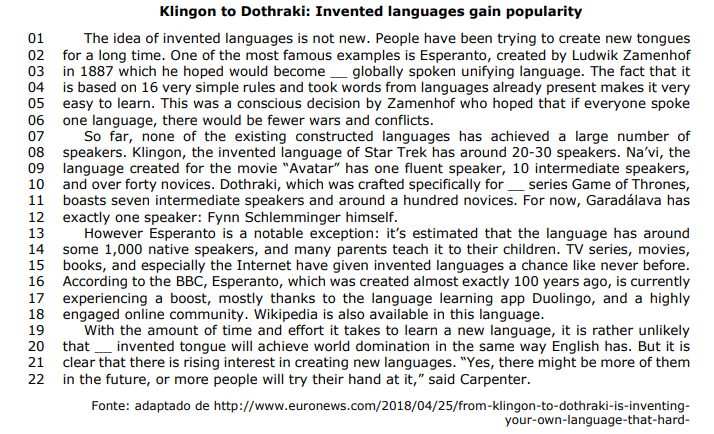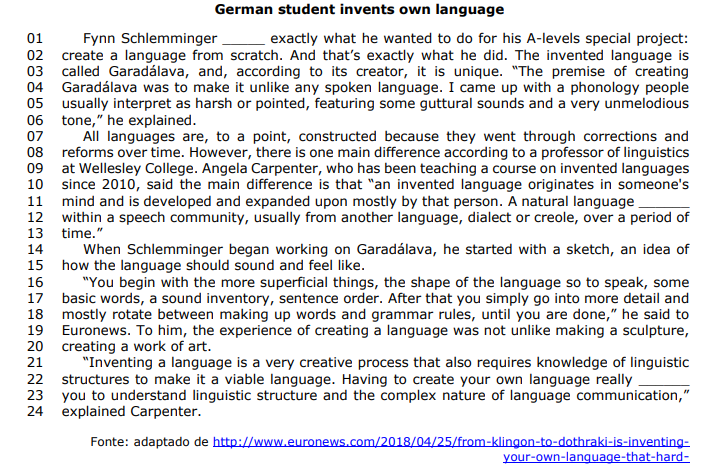Instruction: Answer question based on the following text.

Consider the pair of words below, then judge if they are synonyms (S) or not (N) according to the context of occurrence.
( ) 'conscious' (l.05) – deliberate.
( ) 'notable' (l.13) – remarkable.
( ) 'rather' (l.19) – absolutely.
The correct order of filling in the parenthesis, from the top to the bottom, is:
Instruction: Answer question based on the following text.

Consider the following statements: I. ‘an’ correctly fills in the blank of line 03. II. In order to correctly fill in the blank of line 10, it should be used ‘a’. III. In line 20, the blank should be filled with ‘the’. Which ones are INCORRECT?
Instruction: Answer question based on the following text.

Consider the following statements about the text: I. Garadávala is a language widely spoken in Germany. II. Opposed to invented languages, natural languages are not part of a construction. III. In order to invent a language, one must be both creative and have a good understanding of language structure. Which ones are in agreement with the text?
Instruction: Answer question based on the following text.

Analyse the following statements: I. None of the created languages have a large ammount of speakers, being used only in movies and books. II. Esperanto was created to be an universal language, meant to promote peace. III. Despite the fact that created languages haven’t been globally speaken, in the future they will certainly replace English as the world dominant language. Which ones are correct?
Instruction: Answer question based on the following text.

Consider the following statements. I. The plural of the words ‘sketch’ (l.14) and ‘inventory’ (l.17) follow the same spelling rule. II. To turn a singular sentence into plural, one has to both nouns and adjectives. III. The main rule of verb agreement in the third person singular is to add –s, as it is the case in ‘go’ (l.17). Which ones are INCORRECT?
Instruction: Answer question based on the following text.

Analyse the following statements about word formation. I. ‘unmelodious’ (l.05) and ‘viable’ (l.22) are formed by suffixation. II. Both ‘mostly’ (l.11) and ‘simply’ (l.17) are formed by only adding the suffix –ly. III. The suffix –ly only forms adverbs. Which ones are INCORRECT?
Instruction: Answer question based on the following text.

Evaluate the following translations, considering its contex:
I. People have been trying to create new tongues (l. 01) – Pessoas vem criando novas línguas.
II. none of the existing constructed languages (l.07) – nenhuma das construções de linguagens existentes.
III. there might be more of them in the future (l.21-22) – podem haver mais deles no futuro.
Which ones are INCORRECT?
Instruction: Answer question based on the following text.

Mark the alternative that correctly fills in the blanks of lines 01, 11 and 22, respectively:
Instruction: Answer question based on the following text.

Consider sentences from the text; then analyse the following statements:
I. A possible synonym of 'harsh' (l. 05) is 'rough', considering the context of the sentence.
II. Considering the context, 'who has been teaching' (l.09) should be translated to 'que têm ensinado'.
III. Although it has a gerund form, 'having' (l.22) is classified as an adjective.
Which ones are correct?
Instruction: Answer question based on the following text.

Analyse the following statements:
I. 'So far' (l.07) could be replaced by Up to this time.
II. The expression 'However' (l.13) introduces a statement that contrast with what has been said.
III. 'But' (l.20) introduces an impossibility and could be replaced by Thus.
Which ones are INCORRECT?

